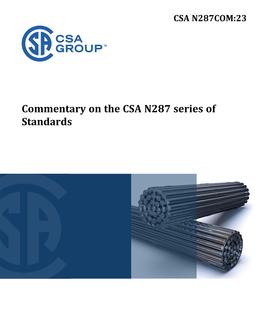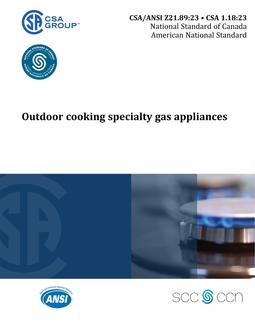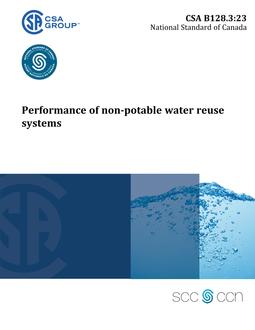
CSA N285.0:23/CSA N285.6 SERIES:23
- Comments Off on CSA N285.0:23/CSA N285.6 SERIES:23
- CSA
Preface
This is the fourth edition of CSA N285.0/N285.6 Series, General requirements for pressure-retaining systems and components in CANDU nuclear power plants/Material Standards for reactor components for CANDU nuclear power plants. It supersedes the previous editions of the CSA N285.0/N285.6 Series published in 2017, 2012, and 2008, the previous editions of CSA N285.0 published in 2006, 1995, 1991, and 1981, and the previous editions of the CSA N285.6 Series published in 2005 and 1988. The major changes to this edition include the following: • updated references, definitions and terminology, documentation, and reporting requirements; • clarified the use of “Class Exempt”; • clarified that requirements for piping system design reports in Clause 7.4.3 are in addition to the Clause 7.4.2 requirements; • clarified content of flowsheets in Clause 7.3.2; • clarified in Clause 5.2.4.1.3 that effective dose is applicable to the NPP worker; • clarified that exemptions from registration for piping systems do not apply to boilers and pressure vessels installed within these systems; • new Annex L added to outline qualifications and duties of AIAs at CANDU NPPs; • recognition of National Board (NB)-accredited quality program (NR) for repairs and replacements; • clarified requirements for supports registration in Clause 6.1.4; • addition of testing program for Class 1, 2, 3 overprotection devices not covered by Clause 13.3.1; • revised Clause 7.6.5.3 to clarify permissibility of spare keys for key interlocks; • new Clause 7.1.10 for treatment of containment proof test; • updated requirements for design registration of piping subassemblies; • removed the need for a statutory declaration from documentation required to register a pump; and • added an exemption from pressure testing for portion(s) of piping systems and lines open to the atmosphere. CSA N285.0 provides general requirements for pressure-retaining systems, components, and supports in CANDU® nuclear power plants. Note: CANDU® (CANada Deuterium Uranium) is a registered trademark of Atomic Energy of Canada Ltd., used under exclusive license by Candu Energy Inc., a Member of the SNC-Lavalin Group. The CSA N285 series of Standards specifies requirements applicable to nuclear power plants in Canada and references the applicable requirements of the ASME Boiler and Pressure Vessel Code (BPVC). The specific objectives of these Standards are as follows: • to establish technical requirements for pressure boundary items of CANDU power reactors, in a format that regulatory authorities can reference; • to establish requirements for each class of system, component, or support, consistent with the Nuclear Safety and Control Act (Act) and its Regulations; • to reference applicable requirements of the ASME BPVC where they are appropriate to CANDU power reactors; • to specify rules and material requirements for the design, fabrication, installation, quality assurance, and inspection of those pressure-retaining components and supports for which the ASME BPVC does not specify requirements; and • to establish rules for the periodic inspection of pressure-retaining components in CANDU nuclear power plants. The CSA N285 series consists of the following Standards and commentary document: • CSA N285.0 — General requirements for pressure-retaining systems and components in CANDU nuclear power plants; • CSA N285.0.1 — Commentary on N285.0-12, General requirements for pressure-retaining systems and components in CANDU nuclear power plants; Note: This commentary is an informative document and provides background, rationale, and context concerning certain clauses and requirements in CSA N285.0. • CAN/CSA-N285.1 — this Standard no longer exists as a separate publication; it was incorporated into CAN/CSA-N285.0-95; • CAN/CSA-N285.2 — this Standard no longer exists as a separate publication; it was incorporated as Annex I of CSA N285.0-08; • CAN/CSA-N285.3 — this Standard no longer exists as a separate publication; it was incorporated as Annex J of CSA N285.0-08; • CSA N285.4 — Periodic inspection of CANDU nuclear power plant components; • CAN/CSA-N285.5 — Periodic inspection of CANDU nuclear power plant containment components; • CSA N285.6 Series — Material Standards for reactor components for CANDU nuclear power plants (published with CSA N285.0); and Note: CSA N285.6.5 was withdrawn in the 2005 edition of the CSA N285.6 Series as the material that it covered (heat-treated Zr-2.5Nb-0.5 Cu wire for fuel-channel spacers) is no longer used for new spacers. • CSA N285.6.0.1 — Commentary for N286.6-17, Material Standards for reactor components for CANDU nuclear power plants; Note: This commentary is an informative document and provides background, rationale, and context concerning certain clauses and requirements in the CSA N285.6 Series. • CSA N285.7 — Periodic inspection of CANDU nuclear power plant balance of plant systems and components; and • CSA N285.8 — Technical requirements for in-service evaluation of zirconium alloy pressure tubes in CANDU reactors. The CSA N-Series Standards provide an interlinked set of requirements for the management of nuclear facilities and activities. CSA N286 provides overall direction to management to develop and implement sound management practices and controls while the other CSA Group nuclear Standards provide technical requirements and guidance that support the management system. This Standard works in harmony with CSA N286 and does not duplicate the generic requirements of CSA N286; however, it might provide more specific direction for those requirements. Users of this Standard are reminded that the design, fabrication, installation, commissioning, and operation of nuclear facilities in Canada are subject to the provisions of the Act and its Regulations. The Canadian Nuclear Safety Commission (CNSC) specifies regulatory and administrative requirements for pressure-retaining systems in their Regulations and regulatory documents. Where CNSC documents conflict with the requirements of this Standard, the CNSC documents take precedence. In this Standard, the CNSC is referred to as the regulatory authority. The Act and Regulations normally require the following items for a nuclear power reactor: a construction licence, an operating licence, and other licences, certificates, and permits specified by the regulatory authority. These licences and certificates can require the licensee to have the following: • registered designs for systems, components, and supports; • registered welding and brazing procedures; • an accepted overpressure protection report; • accepted code classifications, including applicable standards; • accepted record-keeping systems; • accepted quality assurance programs; and • accepted periodic inspection programs. When a licence references this Standard for another type of nuclear reactor facility, Clause 5 of CSA N285.0 should not be considered relevant unless • the facility has a defined exclusion zone; • access to the facility is controlled, permitting entry only by authorized personnel; and • the reactor is inside a containment structure that is capable of limiting releases to the environment in the event of the failure of a pressure-retaining component. These Standards were prepared by the supporting N285 Task Forces, under the jurisdiction of the Technical Committee on CANDU Nuclear Power Plant Pressure-Retaining Systems and Components and the Strategic Steering Committee for Nuclear Power Plants, and have been formally approved by the Technical Committee.
CSA N285.0:23 – General requirements for pressure-retaining systems and components in CANDU nuclear power plants
Scope
1.1 This Standard establishes requirements for pressure-retaining systems, components, and their supports over the service life of a CANDU NPP. The requirements of this Standard address a) construction activities; and b) in-service inspection, modification, repair, and replacement activities.
1.2 This Standard applies to all pressure-retaining systems, including their components and supports, in a CANDU NPP.
1.3 This Standard applies to containment components, but does not apply to containment structures which are covered in the CSA N287 Series of Standards.
1.4 This Standard does not apply to portable assemblies of pressurized items that are temporarily connected to a system or component to enable testing, venting, draining, calibration, or other maintenance activities, provided that they a) do not reduce the ability of a system to perform its design safety function; b) are under surveillance when connected and are removed upon completion of their function; and c) are constructed to Standards deemed by the licensee to be suitable for the application. Note: Safety analysis, environmental qualification programs, or seismic qualification may be used to satisfy the conditions in this Clause.
1.5 In this Standard, “shall” is used to express a requirement, i.e., a provision that the user is obliged to satisfy in order to comply with the Standard; “should” is used to express a recommendation or that which is advised but not required; and “may” is used to express an option or that which is permissible within the limits of the Standard. Notes accompanying clauses do not include requirements or alternative requirements; the purpose of a note accompanying a clause is to separate from the text explanatory or informative material. Notes to tables and figures are considered part of the table or figure and may be written as requirements. Annexes are designated normative (mandatory) or informative (nonmandatory) to define their application.
1.6 The values given in SI units are the units of record for the purposes of this Standard. The values given in parentheses are for information and comparison only. The units in this Standard may be converted in accordance with the ASME BPVC, Section III, NCA-1150.
CSA N285.6.1:23 – Pressure tubes for use in CANDU fuel channels
Scope
1.1 This Standard specifies requirements for the fabrication and properties of seamless zirconium-2.5 wt % niobium (Zr-2.5Nb) alloy pressure tubes for use in fuel channels in CANDU reactors.
CSA N285.6.2:23 – Seamless zirconium alloy tubing for reactivity control units
Scope
1.1 This Standard specifies requirements for the fabrication and properties of seamless zirconium alloy tubing, Grades R60802 and R60804, with diameter to wall thickness ratios less than 80. This tubing is used for reactivity control units in CANDU reactors.
CSA N285.6.3:23 – Annealed seamless zirconium alloy tubing for liquid injection shutdown system (LISS) nozzles
Scope
1.1 This Standard specifies requirements for the fabrication and properties of seamless zirconium-tin alloy tubing, Grade R60802 or R60804, which is suitable for use in liquid injection shutdown system (LISS) nozzles located in the moderator water in the core of a CANDU reactor.
CSA N285.6.4:23 – Thin-walled, large-diameter zirconium alloy tubing
Scope
1.1 This Standard specifies requirements for the fabrication and properties of thin-walled, large-diameter tubing made from zirconium-tin alloys, Grade R60802 or R60804. Notes: 1) Thin-walled, large diameter tubing has a diameter to wall thickness ratio greater than 50. 2) This tubing can be used as calandria tubes and as tubes for reactivity control units in a CANDU reactor, and may be processed in the seamless or seam-welded condition.
CSA N285.6.6:23 – Non-destructive examination criteria for zirconium alloys
Scope
1.1 This Standard specifies requirements for non-destructive examinations (NDEs) of zirconium alloy components during manufacturing. NDE methods include visual, radiographic, liquid-penetrant, ultrasonic, and eddy current techniques. 1.2 Other standards may be used for the NDE of zirconium alloys, provided that they satisfy the requirements of this Standard.
CSA N285.6.7:23 – Zirconium alloy design data
Scope
1.1 This Standard specifies the physical and mechanical property data to be used in the design of the zirconium alloy components specified in the CSA N285.6 Series.
CSA N285.6.8:23 – Martensitic stainless steel for fuel-channel end fittings
Scope
1.1 This Standard specifies requirements for martensitic stainless steel forged blanks for the fuel-channel end fittings of a CANDU reactor.
1.2 Design data for end-fitting material are given in the following tables in Annex A: Table A.1 – Minimum mechanical properties Table A.2 – Design stress intensity values Table A.3 – Moduli of elasticity (Young’s modulus) Table A.4 – Thermal expansion data Table A.5 – Thermal conductivity data
CSA N285.6.9:23 – Materials for supports for pressure-retaining items
Scope
1.1 This Standard specifies requirements for material for the support of pressure-retaining items in CANDU nuclear power plants. The materials covered in this Standard are in addition to the materials permitted by the ASME Boiler and Pressure Vessel Code (BPVC), Section III, Division 1, NF-2000, and Code Cases.
CSA N285.6.10:23 – Nickel-based alloy wire for fuel-channel spacers
Scope
1.1 This Standard specifies requirements for the nickel-based alloy (UNS N07750) wire used to form spacers for use between the pressure tubes and calandria tubes in the fuel channels in a CANDU reactor.
CSA N285.6.11:23 – Zirconium alloy wire
Scope
1.1 This Standard specifies requirements for wires made from zirconium-tin alloy, Grade R60802 or R60804, used in the welding of zirconium components and in the manufacture of the spacers that are installed between pressure tubes and calandria tubes in the fuel channels in a CANDU reactor.
CSA N285.6.12:23 – Zirconium alloy bars and rods for reactivity control units
Scope
1.1 This Standard specifies requirements for the fabrication and properties of zirconium alloy bars and rods, Grades R60802 and R60804, used for fabrication of reactivity control units in CANDU reactors.
CSA N285.6.13:23 – Zirconium alloy sheet, strip, and plate for reactivity control units
Scope
1.1 This Standard specifies requirements for the fabrication and properties of zirconium alloy sheet, strip and plate, Grades R60802 and R60804, used for fabrication of reactivity control units in CANDU reactors.
CSA N285.6.14:23 – Bellows attachment rings for use in CANDU reactors
Scope
1.1 This Standard specifies requirements for the fabrication of centrifugal castings, chemical and mechanical properties and inspection of high strength steel, to the general requirements of ASTM A-148, which is required for bellows attachment rings (BAR) for attachment to fuel channel end fittings.
Product Details
- Edition:
- 4th
- Published:
- 06/22/2023
- ISBN(s):
- 9781488345791
- Number of Pages:
- 237
- File Size:
- 1 file , 3.1 MB
- Product Code(s):
- 2430404, 2430404
- Note:
- This product is unavailable in Russia, Ukraine, Belarus



